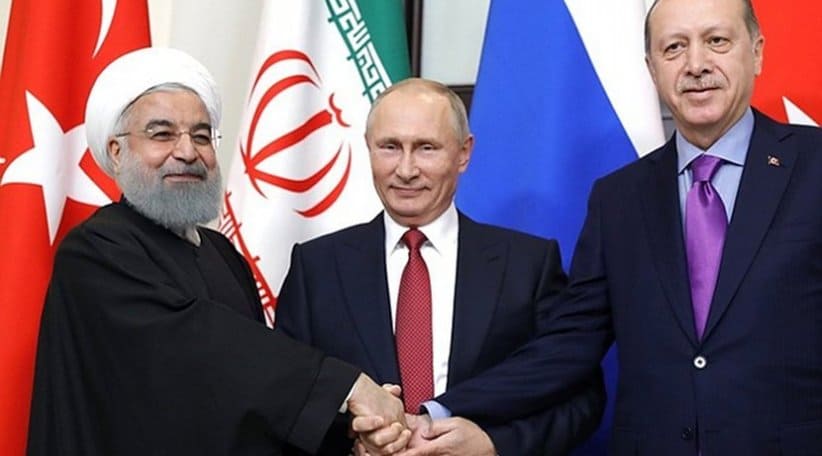The Russia-Iran-Turkey Triangle and the Astana Format
No Expected Breakthrough on Syria, but Cooperation Will Be Extended

On August 1-2, a new meeting on Syria will be held in Nur-Sultan (Kazakhstan) as part of the Astana series of peace talks, and towards the end of August, Ankara will host a trilateral Russia-Iran-Turkey summit. These two forums, which are almost taking place back to back, clearly demonstrate the desire of the three parties not only to intensify contact, but also to achieve certain results.
By itself, the Astana peace process hardly heralds any new breakthrough solutions. In its existing form, it has already brought significant results, such as the establishment of four de-escalation zones, of which three are completely unbarricaded and have come under the control of the Syrian government. The situation in the fourth zone, Idlib, does not point to a quick, easy outcome. Here the positions of Russia, Syria and Iran the one hand, and that of Turkey, on the other, are significantly different, and nothing is said about the possibility of their convergence.
However, the idea that the Syrian army is preparing a strategic breakthrough in this zone with a complete clean-up of the province is not true. Yes, from 30 to 50 thousand militants are present in the zone, including Jabhat al-Nusra and allied forces, which roughly corresponds to the number of elite units of the Syrian army. But in relation to the total population of the province, this is about 0.9- 1.4%. With such a ratio, an attempt at a frontal offensive could cause mass death among the 3.5 million innocent people who live there. It is obvious that the Syrian army will not do that. Its task is to clear two southern points of the province, connected with the provinces of Latakia and Hama, and the suburbs of Aleppo to the north-east of the Idlib zone. By eliminating these security concerns for the region, the Syrian government is ready to cork-in the rest of the Idlib zone and freeze the conflict, which will then not have any serious impact on the overall situation in the country. This plan is endorsed by Russia and Iran, which believe it is intelligible, but continues to cause opposition from Turkey. Ankara’s motives are clear. These are a) fears of losing face among the Syrian and pan-Arab forces which it supports; and b) concerns about a new mass wave of immigrats into its territory.
Some expansion of the Astana round of talks, with the inclusion of some Arab countries’ representatives as observers also does not entail any serious or rapid progress. Nevertheless, the Astana talks should be continued, even absent any real expectations of fast, effective results, since the further development of the political process in Syria and in the Middle East as a whole will become relevant in the future.
In this regard, the upcoming trilateral summit in Turkey is of interest. First, it is noteworthy that was is initiated by Ankara. Second, since it will occur only three weeks later after the forum in Nur-Sultan, it is quite obvious that it will not repeat its previous agenda.
What follows from this? We see a clearly visible Turkey’s attempt to bring trilateral relations with Russia and Iran beyond the Astana format, to bring them to a wider geopolitical level. This may be of interest not only for Turkey itself, but also for Iran and Russia. Obviously, the Syrian issue here will not be prevalent, the leaders will discuss the whole complex of tripartite political, financial and economic, and, possibly, military-technical relations. In any case, this will further promote trust in a trilateral format. The situation around Iran will undoubtedly be in the agenda, and there is identity or proximity of positions between all three countries. In the financial and economic sphere, curious nuances may well emerge, foreshadowing new development in a number of areas. The Russian peace initiative on the situation in the Persian Gulf may receive support and further development.
On the whole, the development of relations within the Russia-Iran-Turkey triangle will strengthen the positive dynamics in the region, which ultimately can have a positive effect in the Syrian direction.





